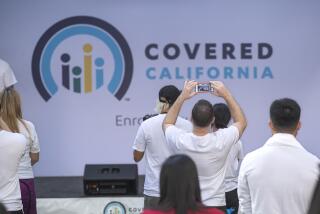Healthcare watch: What qualifies as a special enrollment event in Obamacare
- Share via
Some of our biggest life events can change our healthcare coverage too.
Under the Affordable Care Act, many life changes, such as losing a job, having a baby, moving, divorcing and getting married, allow people to sign up for health insurance throughout the year, outside of the annual open enrollment period.
Obamacare enrollment runs from Nov. 1 through Jan. 31 for 2016 coverage.
Young adults are more likely than any other age group to experience a life event that qualifies them for special enrollment, says Gustavo Herrera, the western director of Young Invincibles, a national organization that seeks to represent the interests of 18- to 34-year-olds.
“Once we explain that getting married, having a kid or moving can be an opportunity to enroll in affordable care, people get excited to talk about their options,” Herrera says.
There’s a limited period to grab a new health policy when life throws big changes your way.
“The one key thing people need to remember is that they have to enroll within 60 days of a qualifying event. It’s not an open window,” says James Scullary, spokesperson for Covered California.
Not all big life changes can alter your insurance coverage — at least not immediately.
At the same time that Tom Jones and his wife learned they were having a baby, they found out that her current insurance policy, which was in place before the Affordable Care Act became law, doesn’t include maternity benefits.
A tax preparer, Jones, who lives in Lake Forest, says he knew that certain changes to life circumstances, like having a baby, triggered an opportunity to switch health plans. He assumed his wife’s pregnancy would qualify. It didn’t. “I was kind of surprised when I found out there wasn’t a special enrollment period for pregnancy,” he says.
“Pregnancy doesn’t allow you to switch plans,” says Michael Mahoney, a senior vice president with Chicago-based online broker GoHealth. “But it allows you to add the child to the plan.”
Here are some common reasons people qualify for a special enrollment period under Obamacare, and some of the nuances that affect qualification:
Losing insurance. According to Covered California, about 4 in 10 of the nearly 130,000 people who qualified for a special enrollment period this year did so because they lost their insurance coverage. Nationwide, it’s even more common, according to EHealth, an online health insurance broker.
The reasons for losing insurance are varied, says Betsy Imholz, special projects director with Consumers Union, the parent organization of Consumer Reports. The loss of a job-based plan, aging out of a parent’s coverage at the age of 26, losing coverage through divorce, or losing eligibility for Medi-Cal, the state’s insurance program for people with low incomes, trigger a special enrollment period.
Imholz says she worries that many people aren’t aware that after leaving or losing their job they can sign up for a plan through Covered California that qualifies them for a tax credit to lower their insurance costs.
“People feel COBRA is their only option,” she says.
If you continue your current job-based health plan through COBRA (the Consolidated Omnibus Budget Reconciliation Act), you’ll have to hold onto that policy until it ends or the next annual open enrollment comes around when you can sign up for a new plan. Canceling COBRA before it expires does not count as a qualifying event triggering a special enrollment period.
“Once you take COBRA, you can’t just drop it,” Imholz says. In fact, losing insurance because of something you do yourself — say, stopping payment because you believe that your plan is too pricey — won’t qualify you for a special enrollment period.
Moving. Most health plans operate within a specific geographic area. If you permanently move to a new city or ZIP Code, you may qualify for a special enrollment period and have the chance to pick a new plan.
Moving, according to Covered California, was the third most common reason people in the state qualified for a special enrollment period this year. Nationwide, EHealth found it accounted for 10% of special enrollment periods among its clientele.
“If you’re moving to a ZIP Code where an additional plan is now offered or a plan that was offered is no longer available, that’s a qualifying life event,” says Mahoney of GoHealth. “The thought process behind that is you chose the plan you chose because it was one of a number of plans that was available. If the plans available to you are now different, maybe you’ll make a different decision.”
Change to family size or income. A change in your family’s size or income can affect your eligibility for tax subsidies to lower your insurance costs, or for Medi-Cal, which, unlike private insurance, allows those who qualify to enroll year-round.
You can add someone to your health plan if you get married, or if you have or adopt a child. Losing insurance coverage because of divorce also qualifies you to buy a new policy during a special enrollment period.
Jones of Lake Forest says it’s upsetting that pregnancy won’t qualify his wife for a special enrollment period. “I feel like I’ve fallen through the cracks,” he says.
He worries about what the pregnancy will cost, he says, and continues to look for some way to get the coverage he and his wife now need. “I’m still crossing my fingers or maybe I’m slightly in denial to think that something is going to pull through.”
Resources and links:
To learn if you qualify for special enrollment:
Covered California: https://tinyurl.com/ovzvym2 or call the Service Center at (800) 300-1506.
Healthcare.gov online screening tool: https://www.healthcare.gov/screener
Young Invincibles special enrollment toolkit: https://younginvincibles.org/special-enrollment
Twitter: @lisazamosky
Zamosky is the author of “Healthcare, Insurance, and You: The Savvy Consumer’s Guide.”
More to Read
Inside the business of entertainment
The Wide Shot brings you news, analysis and insights on everything from streaming wars to production — and what it all means for the future.
You may occasionally receive promotional content from the Los Angeles Times.










